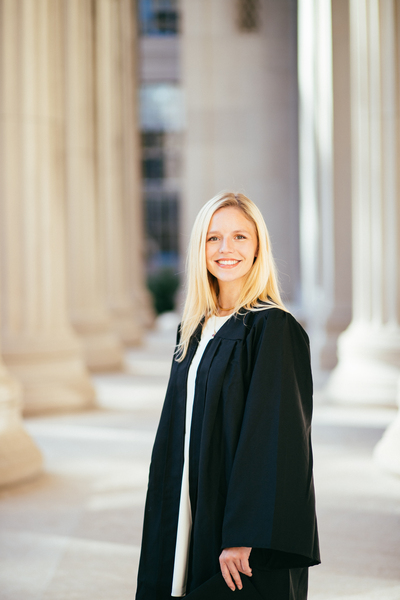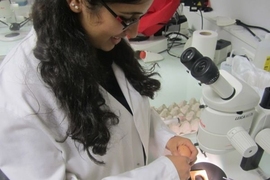Grace Moore ’21, a recent graduate of the MIT Department of Materials Science and Engineering (DMSE), is the first from MIT to receive the prestigious Michel David-Weill Scholarship, which provides funding for graduate study at Sciences Po in Paris, France. The scholarship carries an approximate monetary value of $80,000 and covers the cost of tuition and living expenses.
The scholarship’s eponym, Michel David-Weill, is an alumnus of Sciences Po and former chair of Lazard Frère. His foundation created this award to encourage exceptional American students to pursue their graduate education at his alma mater. The university specializes in the social sciences and offers multidisciplinary programs taught in both English and French. Each year, the awards committee selects one American student who exemplifies the core values embodied by Michel David-Weill: academic excellence, leadership, multiculturalism, tolerance, and high achievement.
Sciences Po has held a longtime partnership with the Institute through the MIT International Science and Technology Initiatives (MISTI) MIT-France program. MISTI supported Moore’s candidacy.
“MIT was honored to endorse Grace Moore as a candidate for the Michel David-Weill Scholarship,” says Candi Deblay, program manager for MIT-France. “Grace is committed to graduate studies at Sciences Po. She views France as a model for environmental reform at the national level and has demonstrated that she has a clear vision and the necessary expertise to navigate the French environmental and educational systems. We gave our strongest endorsement and look forward to her next steps in France.”
Moore graduated in February with a bachelor of science in materials science and engineering (Course 3), recognized with both Phi Beta Kappa and Tau Beta Pi honors. This fall, she will begin a two-year master’s program in the energy, environment, and sustainability stream of public policy at Sciences Po. With her robust academic foundations at MIT and Sciences Po, she hopes to support decision-makers with a scientific perspective on climate change, its implications and potential future risks, and considerations of politically and economically feasible pollution mitigation strategies.
When asked about her motivations and inspirations as she pursued this amazing opportunity, Moore said, “I have a heartfelt belief that international collaboration in environmental policy is an imperative mechanism for addressing our climate crisis.” Moore went on to credit her formative experiences with NEET Advanced Materials Machines track internationally and working on the MIT Climate Action Plan in the Office of the Vice President for Research.
Her impressive academic candidacy was bolstered by a wealth of involvement and service across campus. A member of Alpha Phi sorority, the varsity field hockey team, and the alpine ski team, Moore also acted as a first-year advisor and teaching assistant for the Talented Scholars Resource Room (TSR^2), sharing her experience and academic passion with a new generation of MIT students.
Moore led the Energy Club by educating and lobbying for more efficient energy grids. She helped bring the Surfrider Foundation, a coastal cleanup and conservation organization, to MIT. She gained valuable experience piloting marine cleanup initiatives and plans to translate these experiences to French groups such as Guppy, helping to clean up the Seine. She also plans to take part in the Sciences Po Environment Club and hopes to organize a microplastics sampling initiative in the waterway to help inform local policy.
Moore has been a highly visible part of the DMSE community, active in a multitude of curricular and non-curricular programs and supportive of her classmates. Elsa Olivetti, the Esther and Harold E. Edgerton Associate Professor in Materials Science and Engineering, says that Moore “has been a pleasure to have a part of the DMSE community, patiently pushing us to be the best educators and mentors we can be. She leads by example through her calm diplomacy, unparalleled work ethic, ability to balance and excel at a multitude of pursuits, as well as her commitment to being the best whole contributor to society she can be. She will be a force for bringing about effective change and advancement in environmental policy, linking technical pursuits with the broader context in which they function.”
Moore’s language studies merged with her scientific interests to advance her academic career, making her the perfect example of MIT’s “new bilinguals,” a group of students heralded by the School of Humanities, Arts, and Social Sciences for being well-rounded in both humanities and the sciences.
Raf Jaramillo, assistant professor of materials, says that “Grace will cut her own path to meaningful impact. She truly stands out in her balance of academic success with personal engagement with the world beyond academia. She is without fail inquisitive, self-aware, and friendly, and she does not suffer fools — a powerful combination! To the folks at Sciences Po, I say: Look out!”
The first MIT student to be named a Michel David-Weill Scholar, Moore is planning a career at the intersection of sciences and environmental policy.
Publication Date:
Press Contact:
Rachel
Kemper
Email:
rkemper@mit.edu
Phone:
617-253-6936
MIT Department of Materials Science and Engineering

Caption:
Grace Moore '21 will begin her studies at Sciences Po this fall. Her goal is to work in environmental policy to address climate change.
Credits:
Image courtesy of Grace Moore.
Related Topics
Related Articles







